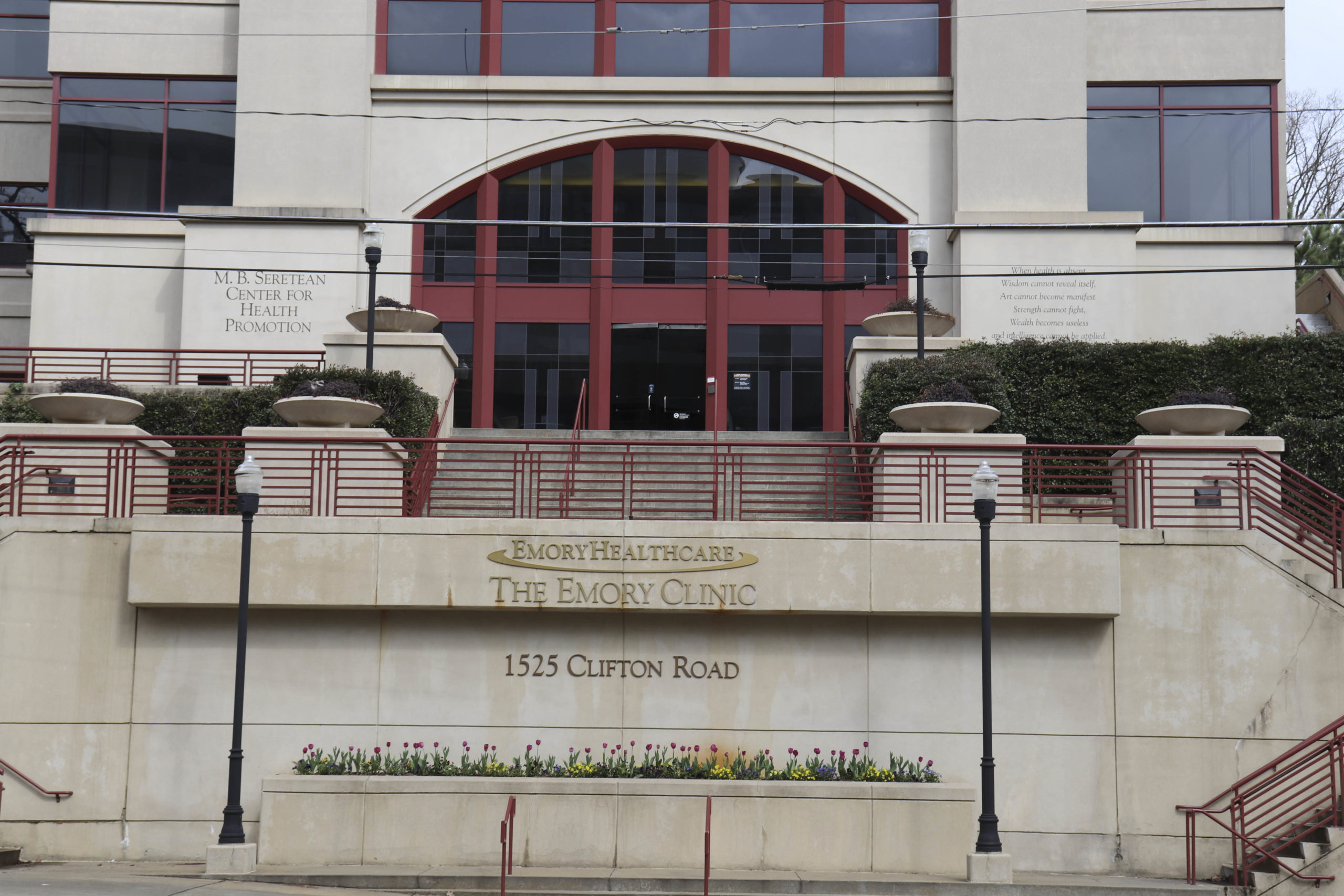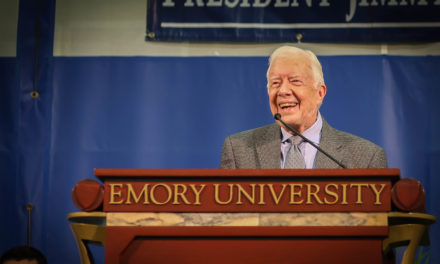
During “Freedom Fighters Speak,” an event hosted by the campus group Freedom at Emory
University, six panelists held a discussion on undocumented students in Harland Cinema on Wednesday night. | Photo by Jason Oh, Staff Photographer
By Emily Lim
Staff Writer
Faculty and students gathered Wednesday night to discuss issues faced by undocumented students in pursuing higher education in Georgia in an event titled “Freedom Fighters Speak: Undocumented Youth and Higher Education in Georgia.”
The event, held at Harland Cinema in the Dobbs University Center (DUC), was hosted by Freedom at Emory University, a group formed this year that advocates for the educational rights of undocumented students.
A panel of speakers representing Freedom University in Atlanta shared personal accounts of their undocumented-status background and opened the floor to a question and answer session.
Freedom University was founded in 2011 following the passage of the Georgia Board of Regents Policy 4.1.6, which effectively bans undocumented students from the top five public universities in Georgia, and Policy 4.3.4, which bans undocumented students from qualifying for in-state tuition at all public institutions of higher education.
“Freedom University is a non-profit organization which offers tuition-free, college-level education to undocumented youths in Georgia,” Professor and Executive Director at Freedom University Laura Emiko Soltis wrote in an email to the Wheel.
In addition to Soltis, the panel of speakers included: National Immigrants’ Rights Project Director of the American Civil Liberties Union of Georgia (ACLU) and President of the National Lawyers Guild Azadeh Shahshahani and students at Freedom University – Ashley Rivas-Triana, Alejandro Galeana Salinas and Melissa Rivas-Triana.
The event was moderated by Senior Director of Debate at Emory Ed Lee and was hosted by the student group Freedom at Emory.
Lee opened the event by describing the panel as, “An act of resistance to the Georgia Board of Regents.” Students and faculty in attendance were able to ask members of the panel several questions via microphones placed in the aisles and through a Twitter feed with the hashtag #freedomatemory.
Georgia is the only U.S. state to prohibit students both from attending top public universities and obtaining in-state tuition, Soltis emphasized in opening remarks.
The Georgia Board of Regents bars students who have been granted a special reprieve from deportation through the Deferred Action for Childhood Arrivals (DACA) memorandum, which was passed by the Obama administration’s Secretary of Homeland Security Jeh Johnson in June 2012, from attending any Georgia institution that has not enrolled all of its academically qualified applicants for the previous two years.
This effectively prohibits undocumented youths from attending institutions in Georgia, such as: the Georgia Institute of Technology, Georgia State University, University of Georgia, Georgia College, Georgia Regents and other colleges and universities across the state.
While Emory is a private university and therefore not bound by the bills passed by the Georgia Board of Regents, its admissions process considers undocumented students as international applicants. They are therefore not eligible for any form of federal financial aid.
“Our mission is to amend Emory’s discriminatory financial aid policies,” College senior Andrew Kim, co-founder of Freedom at Emory told the Wheel in a phone interview. “Emory has an ethical imperative to help undocumented students achieve educational and social justice because of their ability as a private university to amend the institutional policies.”
Freedom at Emory was founded in July 2014, after a group of Emory Scholars from the Scholarship and Service summer program visited the Stewart Detention Center, the largest immigration detention facility in the country.
According to Kim, the students were moved to learn more about the issue, and communicated with Freedom University to found the group.
“This dialogue of documented- undocumented students fueled the formation of Freedom at Emory,” Kim said.
The three Freedom University students in the panel recounted their experiences growing up as undocumented youths in Georgia.
Melissa and Ashley Rivas-Tiana arrived in the United States from Mexico when they were two years old.
Their father’s application for permanent residency was turned down in the spring of 2012.
Both recalled that as juniors in high school, they had to come to terms with the fact that they could not attend university.
“It’s very humiliating to have this unfulfilled vision of yourself,” Rivas-Triana said at the panel. “All the work you did wouldn’t count for anything because you’d end up working at McDonalds.”
Ashley Rivas-Tiana added that she was not even able to apply for her desired institute of higher education, the University of Georgia.
“Not only does [Policy 4.1.6] not let you get financial aid, but it won’t even let you apply,” Rivas-Tiana recalled of her denied application request. “What does legal status have to do with your ability to go to college?”
Both students began attending Freedom University in between managing their jobs when their mother discovered the university via Facebook in the summer of 2012. Speaking from the panel, Soltis stat- ed that as students often had daytime jobs, the university hosts classes for six hours on Sundays.
Freedom University’s mission is to empower undocumented youth and fulfill their human right to education. According to Soltis, classes currently offered at the University include: contemporary Mexico, documentary photography, music composition, human rights and preparation for the SAT and college.
Speaking from the panel, Soltis stated that the name of the university was inspired by the 1964 Summer of Freedom and the Southern Freedom School tradition.
“We believe that all human beings have a universal right to education,” Soltis told the Wheel in an email. “We are committed to providing a safe space for undocumented students to continue their education and regain their dignity as full human beings, in defiance of those discriminatory bans that are ushering in new era of educational segregation the South.”
Freedom University emphasizes the idea of having a safe space for undocumented youth. “It serves more as a safe space for undocumented students to convene and collaborate,” Ashley Rivas-Tiana said.
Emory has collaborated several times with Freedom University over the course of this past year.
According to Soltis, since August Freedom University and Emory students have met for strategy breakfasts and gatherings to advance the goal of educational equality together.
Fifteen Volunteer Emory members visit the University every Sunday to tutor students in the application process.
“Efforts put forth by documented student allies, like the students at Freedom at Emory are infinitely helpful,” Rivas-Tiana said. “I truly believe that the undocumented student movement is propelled forward by the coming together of allies.”
Freedom at Emory aims to change the admissions process at Emory in order to allow undocumented youth to attend the university. Their three key objectives include: documentation status should be included as one of the enumerated categories listed in Emory’s policy 1.3.1, the Equal Opportunities and Non-Discrimination Policy; financial aid policies to provide need-based aid and merit-based scholarships to undocumented students; and Emory should incorporate into its mission into action by helping achieve social justice for undocumented youths.
Freedom at Emory is currently working towards publicizing issues related to undocumented youth by encouraging student organizations to show support for their cause.
“Students can get involved by encouraging any student organization that they’re a part of to endorse our initiative by sending a short statement of support to freedomatemory@gmail. com,” Kim said. “Faculty and alumni can do the same.”
Kim also expressed desire to work more closely with Emory’s university administration.
“We are eager to hear what President Wagner or other members of the committees which make changes in Emory’s admissions or financial aid processes,” Kim said. “We are eager to hear from them in order to challenge these discriminatory policies.”
College freshman Margaret Stewart, who is one of the volunteer tutors for the Volunteer Emory program at Freedom University, felt inspired.
“It was inspiring to hear about how they are working to overcome problems,” Stewart said. “It was interesting to hear the argument in a different format from the service trips.”
College junior Alex Riebman, who researches with the Scholarly Inquiry Research at Emory (SIRE) program into immigration reform and laws, attended because he saw the event as an opportunity relevant to his research interests.
“Although I have always been pro-immigration, the event made me realize that Georgia has been pretty discriminating,” Riebman sad. “Although the general perception is that immigrants are leeches, they are legitimate people who can actively improve our society, and it is wrong to discriminate against them.”
– By Emily Lim, Staff Writer
The Emory Wheel was founded in 1919 and is currently the only independent, student-run newspaper of Emory University. The Wheel publishes weekly on Wednesdays during the academic year, except during University holidays and scheduled publication intermissions.
The Wheel is financially and editorially independent from the University. All of its content is generated by the Wheel’s more than 100 student staff members and contributing writers, and its printing costs are covered by profits from self-generated advertising sales.






